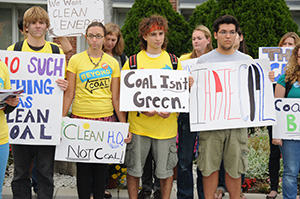
The Sierra Club held a rally at Binghamton University on Wednesday to deliver a new report to University officials regarding coal usage on college campuses.
The Sierra Club, a grassroots campaign group, is encouraging colleges to use energy sources other than coal.
According to Lucy Midelfort, the Green Corps organizer of the Sierra Club, which released the report, BU is among Ohio University, Penn State University, Virginia Polytechnic Institute and State University and the Universities of North Dakota and North Carolina as highlighted schools.
Many schools who have been recognized for their “green efforts” are still using coal for energy and it is time to put an end to it, she said.
The Sierra Club held its rally at 11 a.m. in front of the Couper Administration Building.
During the rally, the Sierra Club delivered the report to the Office of Administration, while an estimated crowd of 20 BU students held signs portraying their displeasure for coal and the importance of acting now.
Three students spoke about their involvement and the importance of the campaign.
“We are here because we care about people’s health, we care about the environment and we care about the message that Binghamton University sends to other campuses,” said Chiara Zaccheo, an undeclared freshman who spoke first.
Zaccheo explained how she envisions a future where buildings are no longer heated by coal technology.
Getting away from coal is dependent on BU’s priorities, she said. Other universities in New York, such as Cornell University, have already become “independent from coal.”
According to Zaccheo, Sierra Club’s campaign was launched at over 30 other campuses.
Emily Fonti, a sophomore environmental studies major, spoke about how she wants to be a part of a college that is committed to innovation and forward thinking.
“The fact that we burn coal here on campus seems to me to be a direct affront to that vision of mine,” Fonti said. “This campus simply cannot call itself ‘green’ if it still burns coal on-site.”
All of the speakers at the rally called on BU’s administration to take immediate action regarding the usage of coal in the campus heating plant.
“The effects of continuing to burn coal are too many, too great, for me to stand aside and let it happen,” Zaccheo said.
The report on the campus’ coal usage was delivered to Vice President for Administration James Van Voorst.
According to Van Voorst, the report specifically mentioned the University’s central heating plant, which provides heat to the campus.
The plant uses gas, wood chips and coal, with a sulfur content of less than 1 percent, and it runs on an “on-demand program,” which means that coal is delivered only when needed in order to avoid runoff issues, Van Voorst said.
“From 2000 to today, we’ve reduced our carbon footprint by 14 percent at a time where we’ve had substantial enrollment growth,” Van Vorst added.
According to Van Voorst, BU was the only SUNY school to be named on the Princeton Review Green Rating Honor Roll and last year won numerous high-ranking honors regarding the school’s recycling program.
In her speech, Zaccheo also commented on BU’s recent achievements.
“BU was recently recognized as a leader in sustainability, but those ratings are ignoring a dirty little secret: the fact that coal, the dirtiest of all energy forms, is burned right here on this campus,” she said.
According to Van Voorst, since 2007 BU has implemented a program where the school uses a biomass fuel such as wood chips as a major component to power the plant.
“By replacing fossil fuels with the wood chips, we’ve reduced 18 percent of our fuel usage,” he said. “[The University is] looking at the solar and wind options as well to see if we’re in the right place and to see if we have the capability to use those energy sources as well.”


